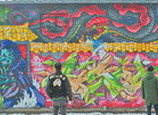
Quentin Tarantino blows into China with singular style
He may be a low-production movie director, but every time a new work comes out, it generates a buzz. He has a special preference for blood, foul language, sex and violence, but these elements often give off more humor than horror. To some, he's an "inglourious basterd," but to his fans inside and outside the movie industry, he is a genius.
He is Quentin Tarantino, a guicai (ghost genius) as his Chinese fans call him. They explain the nickname to mean, "The devil only knows how he thinks."
In just a few days, Django Unchained, Tarantino's latest Oscar winning movie will be screened in public theaters across the Chinese mainland. As the first Tarantino work to be imported into the mainland, local fans are thrilled, enough so that some wonder whether it is an indication of looser censorship.
Illegal love:
underground influence
Many Tarantino fans in China stumbled upon him through "illegal" means, like pirated online versions or DVDs.
Cheeky Jiang, a Beijing Film Academy student, told the Global Times that his first Tarantino movie was Pulp Fiction (1994) when he was only 16.
"When I saw the cover picture, I thought it was porn. So I downloaded it," Jiang said.
It does not take long for a Tarantino movie to win a new fan or drive one away. For those who like them, it's love at first sight, just like Jiang.
It's hard to say what specific things attract the audience, but as most agree, his works are "abnormal," especially for Chinese audiences who grew up with mainstream entertainment options.
In Tarantino's movies, common thinking about good and evil get challenged; protagonists do not always survive to the end or die heroically. In fact, there doesn't even have to be a protagonist, and stories are not always told chronologically. Most importantly, violent and bloody scenes become enjoyable and contain a strange aesthetic artistry.
Some people say that these characteristics are all Tarantino films have and that he repeats the same tricks in every movie, only changing the setting: World War II in Inglourious Basterds or pre-Civil War America in Django Unchained.
"That's exactly what I like about it," Jiang answered, "you never know [in what setting] he's going to shock you."
And it's not only moviegoers, but many Tarantino fans are professionals in the Chinese movie industry.
While Tarantino pays tribute to his predecessors by mimicking their works in his own movies, many famous Chinese moviemakers like to mimic Tarantino.
One example often discussed is from Hong Kong director Yip Wai Man's Sixty Million Dollar Man (1995), in which a dance scene of Stephen Chow is quite similar to the one John Travolta and Uma Thurman shared in Pulp Fiction.
Mainland director Jiang Wen's 1997 work The Sun Also Rises is said to be mimicking Tarantino's circular narrative: the movie is filled with several seemingly independent stories, but the same characters may occur in different stories.
Small fan base:
slang untranslatable
Despite their inexplicable love for him, Tarantino fans in China have not grown to a large number over the decades.
Asia Yu, who claimed to be a hardcore Tarantino fan, told the Global Times that when she "fell in love" with Tarantino's movies, she tried to introduce them to her schoolmates and friends. But to her disappointment, few people around her could understand, so she turned to the Internet to find other fans.
Being unable to follow the English dialogue and getting no help from poor-quality subtitles are what Yu thinks are the major obstacles preventing Chinese from understanding his movies.
"If you are careful enough, you will find the plots of his movies are pushed forward by the dialogue," Yu said. It's worth noting that Django was the writer/director's second Oscar-winning screenplay.
Understandably, most Chinese find movies filled with slang difficult at best. And without access to legal copies of Tarantino movies, inaccurate subtitles mislead viewers.
Yet, even at some social network sites, such as douban.com and tieba.baidu.com where Tarantino fans gather, the atmosphere is not active.
"You can find posts written years ago still there on the front page," Yu said.
Sex in chains:
violence out on bail
It's good news for domestic Tarantino fans. Now they do not need to look for pirated versions of Django Unchained or spend several hundred yuan buying a legal copy from overseas.
Yet, it is far from certain whether this movie will bring a deeper recognition of Tarantino's talent as a director among Chinese moviegoers.
Industry insider and movie critic Succeed Be said he believes Django Unchained will perform well at the box-office not because of Tarantino - but because of Leonardo DiCaprio who plays the main villain in the film.
"Inception is a good example," Be said, explaining that two blockbusters by the same director, Christopher Nolan, had different fates in China: while Inception starring Leonardo DiCaprio did very well, Nolan's other work, The Dark Knight Rises, did less well.
It's also possible that the theaters will stay relatively empty. "Those who do like Tarantino's work will have seen the movie already by various means," Yu said, adding that some fans may still go to the cinema to show support.
For the uninitiated, Django Unchained will be as hard to understand as Tarantino's other films.
Also, insiders as well as common fans believe the importing of Django Unchained has little to do with the loosening of censorship. It seems that compared to sex or politically sensitive topics, Chinese regulators tolerate violence to a greater degree.
One recent example is Stephen Chow's Journey to the West: Conquering the Demons. It was criticized for being too violent and bloody for children, but had no problem screening in public theaters.
"It depends on the theme and topic," Be commented. "If he keeps making violent movies and does not touch sensitive topics, perhaps [his future works] will also come in. But if he goes back to his art works or B-movies like Grindhouse [from 2007], it will be tough."
Perhaps the Chinese moviegoers who might most enjoy Django would be fans of the horror genre. They often complain of poor quality productions, but here is one film they might find splendidly horrific.
















 Our luxuriously departed Paper-made "luxury" goods replace paper money as top offerings to the dead during Qingming
Our luxuriously departed Paper-made "luxury" goods replace paper money as top offerings to the dead during Qingming


![]()
